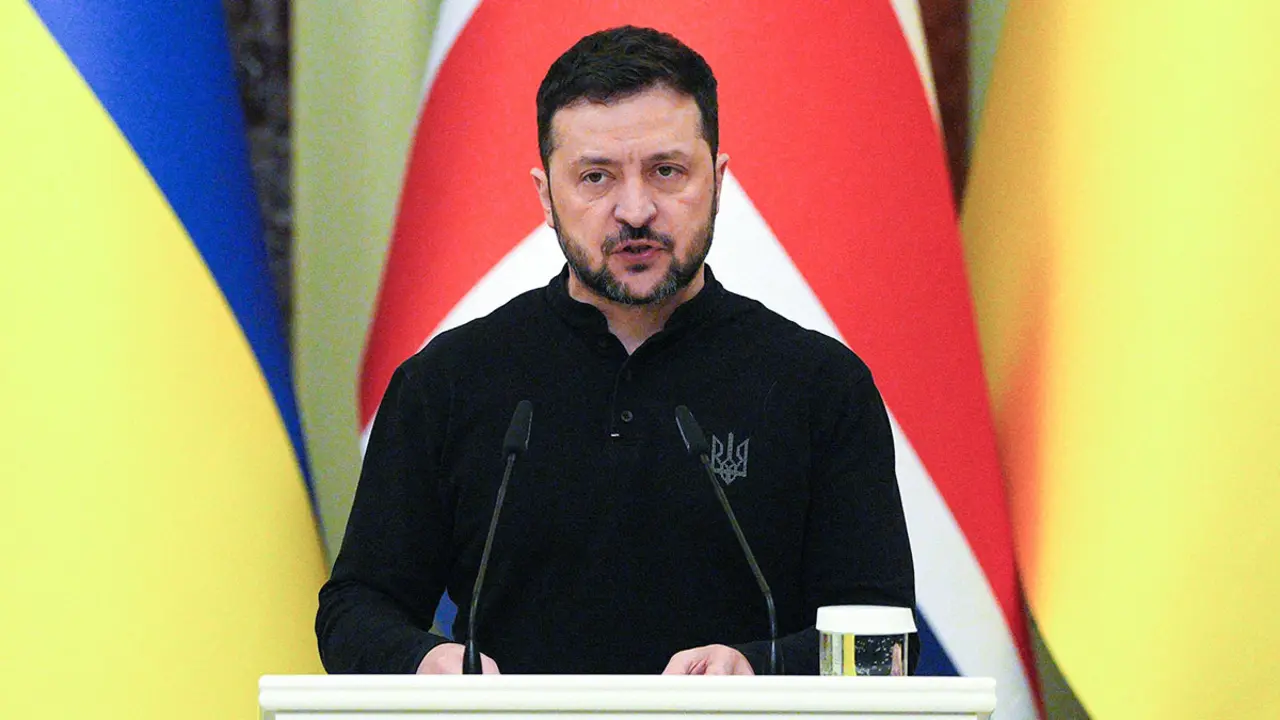Netanyahu freezes his judicial reform to defuse political storm

Netanyahu is buying time. The Israeli Prime Minister appeared on Monday afternoon to announce a halt to his controversial judicial reform that has led Israel into one of the biggest political crises in its history. "In order to avoid a rift in our people, I have decided to suspend the vote on the second and third readings of the legislation in the current session of the Knesset, in order to try to reach an understanding on the legislation during the next session," Bibi said in a conciliatory but defiant message. There will be no reform, at least not until 30 April, when the House reconvenes after the recess that begins on Sunday.
But Bibi reaffirmed his commitment to implement it. "We insist on the need to introduce the necessary corrections to the judicial system. We are seizing an opportunity to achieve them with broad agreement," said Netanyahu, who said he had the backing of his coalition partners. The Prime Minister is keeping his finger on the pulse of the hundreds of thousands of demonstrators who have taken to the streets of the country for the past 12 weeks. He is not shelving the measure but postponing it in a search for consensus with the opposition. His aim, he said, is to "provide a real opportunity for real dialogue".
"I am aware of the enormous tension that is building between the two sides, the two parts of the nation. I am attentive to the desire of many citizens to ease this tension," he added after comparing the situation in Israel to the biblical story of King Solomon and the two women claiming motherhood of the same son. "Also today, both sides in the national dispute are claiming the love of the baby, the love of the country". Netanyahu was thus trying to raise his profile as a statesman, but the responsibility for Israel being "in the midst of a crisis that endangers the basic unity between us", as he noted in his speech, is his own.

The announcement "comes too late, when immeasurable damage has already been done to the state, the army and the economy," writes columnist Amos Harel in the daily Haaretz. "It is harder than ever to believe the Prime Minister's promises. There is good reason to suspect that Netanyahu is just trying to lull the protest movement and the opposition to sleep while he waits for the next opportune moment." The street received the news in the same way, with scepticism. If he does not go a step further and shelve the judicial reform, the mass protests against the government will continue.
Netanyahu's institutional statement, recorded from the Prime Minister's office on Gaza Street in Jerusalem, which hours earlier had been surrounded by hundreds of demonstrators, did not dampen the mood. In fact, protests on Monday reached unprecedented levels since they began in January in response to the dismissal of defence minister Yoav Gallant, who called for a postponement of reform on national security grounds. Strikes are already affecting hospitals, schools and airports. Meanwhile, Israel's largest trade union, Histadrut, announced a nationwide general strike until the measure is finally suspended.
Gallant, who had privately aired his differences with Netanyahu over the reform, made public the fears of the military leadership. The minister, in close contact with the Israeli Defence Forces (IDF) high command, sensed that the situation could lead the country to a point of no return. In a headlong rush, Bibi announced his resignation. However, the prime minister has not yet sent him a formal letter of dismissal, so his departure from the government has not taken place. Members of Likud, the party of which Gallant is also a member, are now pressuring the prime minister to reverse the decision.

Netanyahu would eventually change his mind after gaining the support of his Justice Minister, Yariv Levin. The main backer of the judicial reform that would give the government the power to select Supreme Court judges had threatened to resign if his chief justice backed down. But he changed his stance on Monday afternoon, just minutes before Netanyahu's appearance on the scene. Levin then pledged to respect any decision by the prime minister and to work to stabilise the coalition in order to prevent the collapse of the government, the most right-leaning in Israel's history.
Netanyahu had also managed to win the support of the inflammatory Public Security Minister Itamar Ben Gvir. The leader of the radical Otzma Yehudit (Jewish Power) gave the government four months to pass the reform in the Knesset, even if there is no agreement with the opposition. In return, Bibi agreed to the creation of a National Guard under the direct control of Ben Gvir's ministry, which would operate as a private militia. "The far-right leader, a convicted terrorist and racist in the past, who was whitewashed and legitimised by Netanyahu, now seems to have at his disposal what could be compared to Iran's Revolutionary Guard Corps," writes journalist Attila Somfalvi in the opinion pages of Yedioth Ahronoth, Israel's largest circulation newspaper.
The Prime Minister's announcement revealed the opposition's differences. But the majority position among political formations tends towards dialogue. Former Prime Minister Yair Lapid, the leader of the country's second-largest political force, the liberal Yesh Atid (There is a Future in English), said he was willing to enter negotiations with the government if President Isaac Herzog was present. The head of state, who first spoke out in early March to call on Netanyahu to take another path to reform the judiciary, repeated the same message on Monday.

The leader of the centrist National Unity Party, Benny Gantz, also welcomed Netanyahu's statement. "Better late than never," said the former Defence Minister and former coalition partner of the current Prime Minister, who is growing exponentially in the latest polls. According to the Channel 12 poll, Gantz's platform would occupy 23 seats in the Knesset, compared to the 12 it currently holds. It would fall just one seat short of Yesh Atid thanks to the votes that would abandon a Likud in a slump.
But other voices in the political establishment are closing ranks with the protesters, who are wary of Bibi's siren songs. "It is impossible to negotiate when Netanyahu and his associates continue the legislative process," said Avigdor Lieberman of the right-wing Israel Beitenu. Labour Party leader Merav Michaeli echoed the sentiment. "How many more times can we fall into the trap of cooperating with Netanyahu?," she asked.








